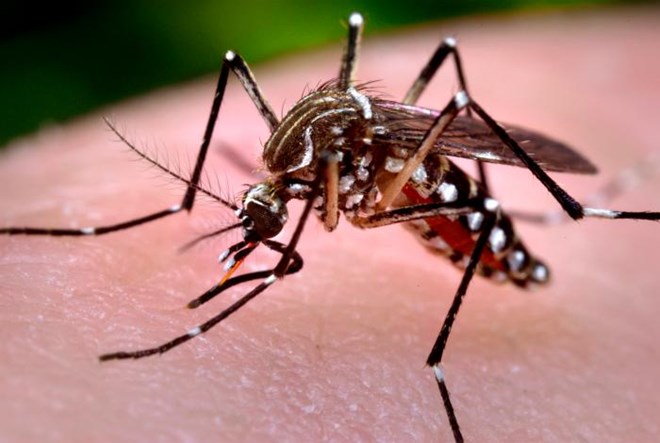
The health sector warned provinces and cities nationwide to be extra vigilant against dengue fever as risk of the return of the disease is high in rainy season, according to the Ministry of Health (MoH).
 |
| Aedes aegypti, a mosquito that spreads dengue fever. |
The health sector warned provinces and cities nationwide to be extra vigilant against dengue fever as risk of the return of the disease is high in rainy season, according to the Ministry of Health (MoH).
The ministry said dengue fever often has a repeating cycle of 4-5 years, and appears in almost all localities across the country, but gets more severe in the southern region.
Due to the scarcity of water in some regions, people, especially in rural areas, tend to store water in big jars, providing ideal conditions for striped mosquitoes to develop, the MoH said, adding that bad sanitary and environmental conditions in residential areas are also facilitating the development of the disease.
According to health officials, the outbreak of dengue fever in 2015, which did not ease up through the early months of 2016 in some provinces and cities, is predicted to continue to grow in an unpredictable pattern in the southern region in the months to come.
According to the MoH, there were 88,324 cases of dengue fever found in 58 provinces and cities in 2015, and 57 deaths from the disease.
Tran Duc Phu, head of the ministry’s Preventive Health Department, said that seeing the high risk of the return of the disease in rainy season, the MoH has implemented larvae-killing efforts nationwide and positive results have been seen in 55 provinces and cities.
The ministry formed eight inspection teams to inspect efforts to combat Zika virus and dengue fever and provide assistance to localities.
Vietnam will respond to the ASEAN Day for fighting dengue fever on June 15, with the introduction of measures to fight the disease and the building of prevention plans from central to local levels.
The health sector will enhance supervision to detect dengue fever cases for timely treatment, and hold campaigns to kill larvae and spray areas of high risk to kill mosquitoes.
Training classes will be held for preventive health employees, doctors and collaborators.
(Source: VNA)





